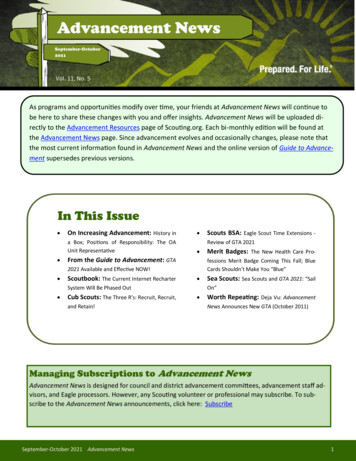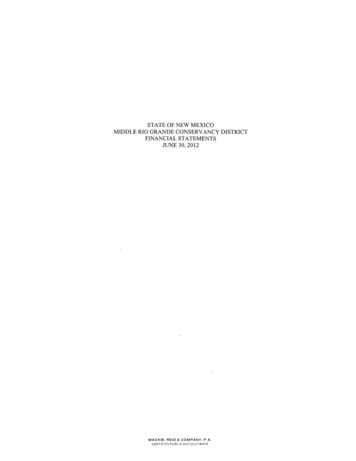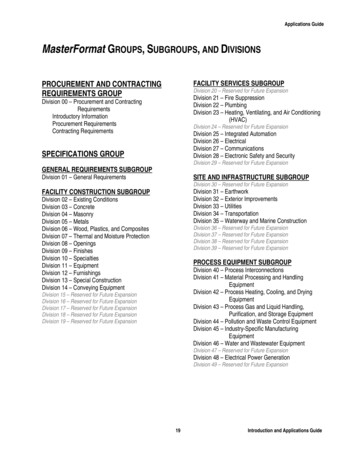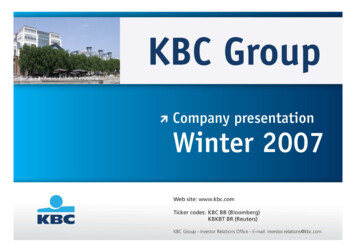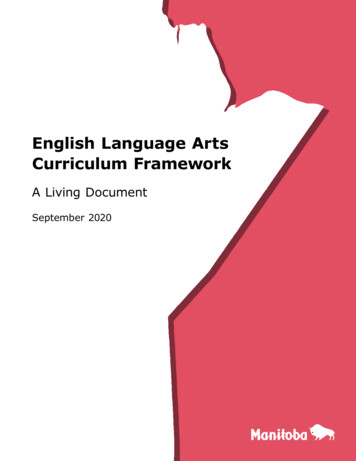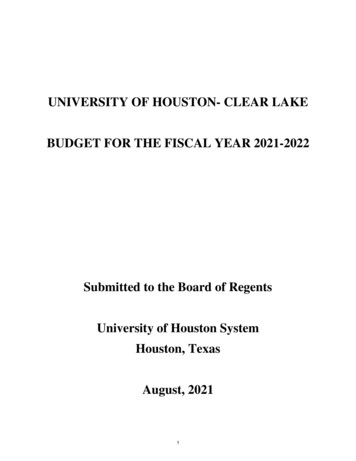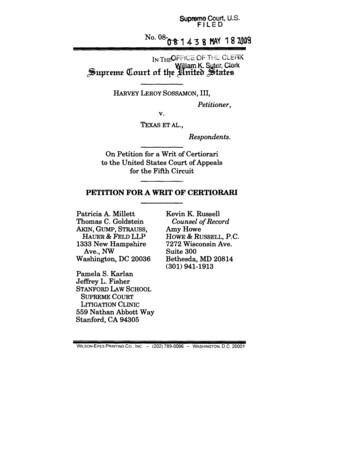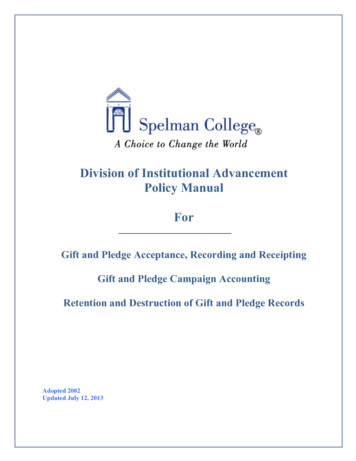
Transcription
Division of Institutional AdvancementPolicy ManualForGift and Pledge Acceptance, Recording and ReceiptingGift and Pledge Campaign AccountingRetention and Destruction of Gift and Pledge RecordsAdopted 2002Updated July 12, 2013
Table of ContentI.IntroductionPreface.4Purpose.4Mission of Institutional Advancement .4Code of Ethical Principles and Standards .5Donor Bill of Rights .6II.Gift AcceptanceOutright Gifts .7U.S. Currency/Checks.7Foreign Currency/Checks .7Credit Cards Payments.8Payroll Deductions .8Electronic Funds Transfer/Recurring Credit Cards .8Assignments of Income.9Quid Pro Quo .9Securities/Wire Transfer .10Personal Property (Tangible and Intangible) .11Real Property .13Gift-in-Kind .14Contributed Services .15III. Gift TypesDeferred Gifts .16Life Income Gifts (Trusts, Annuities, and Pooled Income Funds) . 16 - 18Retained Life Estates .18Life Insurance .19Bequests .21Bequest Intentions.22IV. Gift and Pledge Recording/Campaign AccountingGift Accounting Standards .22Outright and Deferred Gifts .22Undesignated Bequests .22Legal credit .22Credit to last entity .22Second party gifts . ?Corporate Checks (including matching gifts) .23Donor Advised Funds/Donor Directed Funds .23Soft Credit (including matching gifts) .23Gifts Pending Designation or Funds/Accounts .23Institutional Advancement Policy Manual2 Page
V.Pledge Recording StandardsRecording Pledges with Written Documentation .24Recording Telefund Pledges .24Recording Pledges in Good Standing .24Modifications Due to Pledge Overpayments .24Overpayments .25Personal Pledges and Donor-Advised Funds .25Recording of Pledges with Anticipated Matching Gifts .25Non-designated Gifts Received from Donor with Open Pledges .25Pledge Reminders .25All Other Pledges .25Pledge Write-offs .25VI. Gift Receipting StandardsRaffles .26Modifying Gift Records .26Exceptions .26VII. Supplemental PoliciesGift Acceptance Committee .27Gift and Pledge Records Retention and Destruction .27Soliciting Sponsorships and Donations . 27-28Glossary of Terms . 29-30Institutional Advancement Policy Manual3 Page
SECTION IIntroductionPrefaceThe President, appointed by the Board of Trustees, is the Chief Fundraising Officer of the College. ThePresident shall be responsible for all fund raising efforts of the College ensuring proper fund raising goals areset and accomplished in consultation with the Board of Trustees and the Development Committee. ThePresident shall report to the Board on the results of all fund raising efforts on a regular basis.It is the responsibility of the President to recruit and hire Vice President(s) to lead the fund raising operationsthrough the Division of Institutional Advancement. The Vice President for College Relations is the senioradministrator responsible for constituency relations and the Vice President for Development is the senioradministrator responsible for fund raising. Each Vice President reports directly to the President, serves athis/her discretion, and is responsible for the coordination, supervision and direction of the activities as assignedby the President and dictated by the College’s mission and strategic plan.PurposeThis policy is intended to establish the guidelines for the acceptance, processing and reporting of all current anddeferred gifts to Spelman College (“the College” or “the Organization”) and to inform all discussions betweendonors, and their advisor(s), college staff and volunteers acting on behalf of the College.Mission of Institutional Advancement“The mission of Institutional Advancement is to advance the College’s mission by increasing private and publicfinancial support for the College; promoting awareness of the College to key publics and involving ourconstituents in the life of the College.” To that end, Institutional Advancement will properly steward all giftsand give appropriate recognition to the accomplishments of our volunteers, alumnae and students.To fulfill its mission, Spelman College solicits and receives gifts, pledges of money and other property, bothreal and personal, through outright gift, by deferred gift arrangements, and by bequest. InstitutionalAdvancement is the primary channel for all gifts to the College from all private, non-governmental sources.Institutional Advancement recognizes the critical importance of philanthropic contributions to the continuedexistence of the College. Institutional Advancement further recognizes its responsibility to ensure that giftsfrom external sources:§§§§§Are appropriate to the mission of the College;Do not carry restrictions or conditions that may compromise the College;Are legal;Are from donors whose intents are charitable; andAre administered to protect donor’s rights and wishes.Spelman College cannot accept gifts that involve unlawful discrimination based upon race, religion, sex, age,national origin, color, handicap, or any other basis prohibited by federal, state, and/or local laws and regulations.Nor can the College accept gifts which obligate it to violate any other applicable law or regulation or whichviolate the charter or mission of the College.Institutional Advancement will keep confidential all information about donors and prospective donors,including but not limited to their names, address, telephone numbers, gift amounts, and personal financial statusof any kind. This policy shall be revised annually and shall supersede any existing policy or policies purportingto cover the subject matter of this document. Institutional Advancement will adhere to the AFP Code of EthicalPrinciples and Standards and the Donor Bill of Rights.Institutional Advancement Policy Manual4 Page
AFP Code of Ethical Principles and StandardsETHICAL PRINCIPLES Adopted 1964; amended Sept. 2007The Association of Fundraising Professionals (AFP) exists to foster the development and growth of fundraising professionals andthe profession, to promote high ethical behavior in the fundraising profession and to preserve and enhance philanthropy and volunteerism. Membersof AFP are motivated by an inner drive to improve the quality of life through the causes they serve. They serve the ideal of philanthropy, are committedto the preservation and enhancement of volunteerism; and hold stewardship of these concepts as the overriding direction of their professional life.They recognize their responsibility to ensure that needed resources are vigorously and ethically sought and that the intent of the donor is honestlyfulfilled. To these ends, AFP members, both individual and business, embrace certain values that they strive to uphold in performing theirresponsibilities for generating philanthropic support. AFP business members strive to promote and protect the work and mission of their clientorganizations.AFP members both individual and business aspire to: practice their profession with integrity, honesty, truthfulness and adherence tothe absolute obligation to safeguard the public trust act according to the highest goals and visions of their organizations, professions,clients and consciences put philanthropic mission above personal gain; inspire others through their own sense of dedication and high purpose improve their professional knowledge and skills, so that their performance willbetter serve others demonstrate concern for the interests and well-being of individuals affected bytheir actions value the privacy, freedom of choice and interests of all those affected by theiractions foster cultural diversity and pluralistic values and treat all people with dignityand respect affirm, through personal giving, a commitment to philanthropy and its role insociety adhere to the spirit as well as the letter of all applicable laws and regulations advocate within their organizations adherence to all applicable laws andregulations avoid even the appearance of any criminal offense or professional misconductbring credit to the fundraising profession by their public demeanor encourage colleagues to embrace and practice these ethical principles andstandards be aware of the codes of ethics promulgated by other professional organizationsthat serve philanthropyETHICAL STANDARDSFurthermore, while striving to act according to the above values, AFP members,both individual and business, agree to abide (and to ensure, to the best of theirability, that all members of their staff abide) by the AFP standards. Violation of thestandards may subject the member to disciplinary sanctions, including expulsion, asprovided in the AFP Ethics Enforcement Procedures.MEMBER OBLIGATIONS1.2.3.4.5.6.7.8.Members shall not engage in activities that harm the members organization,clients or profession.Members shall not engage in activities that conflict with their fiduciary,ethical and legal obligations to their organizations, clients or profession.Members shall effectively disclose all potential and actual conflicts ofinterest; such disclosure does not preclude or imply ethical impropriety.Members shall not exploit any relationship with a donor, prospect, volunteer,client or employee for the benefit of the members or the members’organizations.Members shall comply with all applicable local, state, provincial and federalcivil and criminal laws.Members recognize their individual boundaries of competence and areforthcoming and truthful about their professional experience andqualifications and will represent their achievements accurately and withoutexaggeration.Members shall present and supply products and/or services honestly andwithout misrepresentation and will clearly identify the details of thoseproducts, such as availability of the products and/or services and other factorsthat may affect the suitability of the products and/or services for donors,clients or nonprofit organizations.9.10.11.Members shall refrain from knowingly infringing the intellectual property rightsof other parties at all times. Members shall address and rectify any inadvertentinfringement that may occur.Members shall protect the confidentiality of all privileged information relating tothe provider/client relationships.Members shall refrain from any activity designed to disparage competitorsuntruthfully.SOLICITATION AND USE OF PHILANTHROPIC FUNDS12.13.14.15.16.Members shall take care to ensure that all solicitation and communicationmaterials are accurate and correctly reflect their organizations’ mission and useof solicited funds.Members shall take care to ensure that donors receive informed, accurate andethical advice about the value and tax implications of contributions.Members shall take care to ensure that contributions are used in accordance withdonors’ intentions.Members shall take care to ensure proper stewardship of all revenue sources,including timely reports on the use and management of such funds.Members shall obtain explicit consent by donors before altering the conditionsof financial transactions.PRESENTATION OF INFORMATION17. Members shall not disclose privileged or confidential information to unauthorizedparties.18. Members shall adhere to the principle that all donor and prospect informationcreated by, or on behalf of, an organization or a client is the property of thatorganization or client and shall not be transferred or utilized except on behalf ofthat organization or client.19. Members shall give donors and clients the opportunity to have their namesremoved from lists that are sold to, rented to or exchanged with otherorganizations.20. Members shall, when stating fundraising results, use accurate and consistentaccounting methods that conform to the appropriate guidelines adopted by theAmerican Institute of Certified Public Accountants (AICPA)* for the type oforganization involved. (* In countries outside of the United States, comparableauthority should be utilized.)COMPENSATION AND CONTRACTS21.22.23.24.25.Members shall not accept compensation or enter into a contract that is based ona percentage of contributions; nor shall members accept finder’s fees orcontingent fees. Business members must refrain from receiving compensationfrom third parties derived from products or services for a client withoutdisclosing that third-party compensation to the client (for example, volumerebates from vendors to business members).Members may accept performance-based compensation, such as bonuses,provided such bonuses are in accord with prevailing practices within themembers’ own organizations and are not based on a percentage of contributions.Members shall neither offer nor accept payments or special considerations forthe purpose of influencing the selection of products or services.Members shall not pay finder’s fees, commissions or percentage compensationbased on contributions, and shall take care to discourage their organizations frommaking such payments.Any member receiving funds on behalf of a donor or client must meet the legalrequirements for the disbursement of those funds. Any interest or income earnedon the funds should be fully disclosed.Members shall establish the nature and purpose of any contractualrelationship at the outset and will be responsive and available toorganizations and their employing organizations before, duringand after any sale of materials and/or services. Members willcomply with all fair and reasonable obligations created by thecontract.Institutional Advancement Policy Manual5 Page
Donor Bill of RightsPhilanthropy is based on voluntary action for the common good. It is a tradition of giving and sharing that isprimary to the quality of life. To assure that philanthropy merits the respect and trust of the general public, andthat donors and prospective donors can have full confidence in the nonprofit organizations and causes they areasked to support, we declare that all donors have these rights:I.To be informed of the Organization’s mission, of the way the Organization intends to use donatedresources, and of its capacity to use donations effectively for their intended purposes.II.To be informed of the identity of those serving on the Organization’s governing board and to expectthe board to exercise prudent judgment in its stewardship responsibilities.III.To have access to the Organization’s most recent financial statements.IV.To be assured their gifts will be used for the purposes for which they were given.V.To receive appropriate acknowledgment and recognition.VI.To be assured that information about their donation is handled with respect and with confidentialityto the extent provided by law.VII.To expect that all relationships with individuals representing Organizations of interest to the donorwill be professional in nature.VIII.To be informed whether those seeking donations are volunteers, employees of the Organization, orhired solicitors.IX.To have the opportunity for their names to be deleted from mailing lists that an Organization mayintend to share.X.To feel free to ask questions when making a donation and to receive prompt, truthful, and forthrightanswers.* 1964, Association of Fundraising Professionals (AFP), all rights reserved. Reprinted with permission from theAssociation of Fundraising Professionals.The Donor Bill of Rights was created by the American Association of Fund Raising Counsel (AAFRC),Association for Healthcare Philanthropy (AHP), the Association of Fundraising Professionals (AFP), and theCouncil for Advancement and Support of Education (CASE). It has been endorsed by numerous organizations.Institutional Advancement Policy Manual6 Page
SECTION IIGift AcceptanceOutright GiftsThis section describes the criteria and procedures for accepting outright gifts, including cash, securities, andproperty. Information in this section identifies types of outright gifts Institutional Advancement will accept,defines minimum gift level requirements for gifts types, identifies those authorized to accept gifts, detailsacceptance procedures, and gives recording standards.Institutional Advancement will accept gifts of cash, including U.S. currency, foreign currency, checks drawnon U.S. and foreign banks, credit card payments, payroll deductions, third-party cash/checks, securities, tangibleand intangible property, and in-kind donations.U.S. Currency/ChecksInstitutional Advancement will accept outright gifts of U.S. currency and checks drawn on U.S. banks that aredeemed to be from legal sources.Minimum Gift Level: There is no minimum gift level.Authorization for Acceptance: None required.Acceptance Procedure: Checks made payable to Spelman College. Currency and checks along with allaccompanying documentation is forwarded to the Donor Services Specialist for deposit. The names of thedonors and allocations must be included.Recording Standards: The amount of gifts of U.S. currency and checks drawn on U.S. banks are recordedas of the date they are entered.Foreign Currency/ChecksInstitutional Advancement will accept outright gifts of foreign currency and checks drawn on foreign banks thatare deemed to be from legal sources.Minimum Gift Level: There is no minimum gift level.Authorization for Acceptance: None required.Acceptance Procedure: Checks are made payable to Spelman College. Currency and checks along with allaccompanying documentation is forwarded to the Donor Services Specialist for deposit. The names of thedonors and allocations and the value of the gifts based on exchange rates on the date of receipt must beincluded. Note: The College may incur substantial bank charges to process gifts of foreign currency.Recording Standards: Foreign currency and U.S. currency drawn on foreign banks will be recorded as giftsas the date they are received. Gift values will be based on exchange rates on the date of receipt. Donorswill receive credit in U.S. dollars for the amounts at which gifts are valued.Return Check Notifications: Upon notification by the Office of Business and Financial Affairs that adonor’s check has not been honored by their banking institution, a letter is sent to the donor notifying themof this fact.Institutional Advancement Policy Manual7 Page
Credit Card PaymentsThe College will accept gifts via Credit Cards that are deemed to be from legal sources.Minimum Gift Level: There is no minimum for one time credit card gifts. The minimum gift level forrecurring credit card payments is 10 per month.Authorization for Acceptance: None required.Acceptance Procedure: Documentation of donors’ names as they appear on their credit cards, credit cardtypes (VISA, MasterCard or American Express only), account numbers, expiration dates, and allocations.It is not necessary to be in possession of the credit card to accept a credit card gift. InstitutionalAdvancement staff will take all reasonable precautions to keep donors’ credit card information confidential.Recording Standards: Credit card gifts are recorded as of the date they are accepted. For recurring creditcard payments, the number of monthly deductions is pre-determined by the donor.Credit Card Notifications: Donors are notified by phone, email or letter when their credit card has beendeclined, expires, or if required information is missing.Payroll DeductionsMinimum Gift Level: The minimum gift is 5 per pay period.Acceptance Procedure: To establish a program of recurring payroll deductions, employees must submit asigned payroll deduction form authorizing the gift deductions to Institutional Advancement. Notice mustbe provided at least two weeks prior to the start of a pay period. The deduction may be changed bycontacting Institutional Advancement in writing.Recording Standards: A pledge will be recorded based on the amount of the deduction. Payments arerecorded upon receipt of the deduction reports from the Payroll Office using the Banner automated payrolldeduction process. For continuous deductions, the pledge is recorded for a 24 month period.Termination: The deduction may be stopped by contacting the Director of Advancement or the DonorServices Specialist in writing. Unless otherwise advised by employees who end their service with theCollege and have not fulfilled their pledge that they intend to fulfill their pledge by check, their payrolldeduction pledge will be reduced to reflect the amount paid.Payroll Deduction Notifications: Employees are notified by email when their payroll deduction pledgeshave been fulfilled or if a problem is encountered in the processing of their payroll deduction. The Officeof Annual Giving is copied on the email.Electronic Funds TransferMinimum Gift Level: The minimum gift level is 10 per month.Acceptance Procedure: Interested donors must fill out an authorization form (which can be obtained fromthe Spelman College website) and attach a voided check. The donor’s account will be debited at a date ofthe donor’s choosing. The number of monthly deductions is pre-determined by the donor and will continueuntil notification is received from the donor.Recording Standards: An annual pledge is recorded based on the amount of the monthly EFT. Paymentsare recorded on a monthly basis following the execution of the bank debit process by the Donor ServicesSpecialist. Donors are notified when their debits are declined.Termination: The EFT may be stopped by contacting the Director of Advancement Services or DonorServices Specialist in writing. Three consecutive declines will result in termination of the EFT.Institutional Advancement Policy Manual8 Page
EFT Notification: Office of Advancement Services notifies donors by email or telephone when their EFTis not honored by their banking institution. Upon the second consecutive occurrence, the donor is referredto the Office of Annual Giving for follow-up prior to terminating the EFT.Assignments of IncomeInstitutional Advancement will accept third-party gift assignments. A donor may assign to the College incomethe donor is entitled or authorized to receive from a third party, such as payment for service on a corporateboard, honoraria, consulting payments, etc. Donors may also endorse checks written in their name to be paidto Spelman College.Minimum Gift Level: There is no minimum gift level.Authorization for Acceptance: None required.Acceptance Procedure: Properly endorsed check from donor. Assigned gifts from third parties shouldidentify the donor making the assignment and the specified designation, if any.Recording Standards: Gifts will be recorded upon receipt of payment from either the donor or the thirdparty.Note: Per Internal Revenue Service requirements, unless it is known that a 1099 will be sent by the thirdparty to the donor directing the assignment of income, the third party will be legally receipted for thecontribution. Soft credit will be given to the individual to whom payment would otherwise have been made.Quid Pro Quo ContributionsInstitutional Advancement will accept quid pro quo contributions, such as contributions resulting from fundraising events. The Internal Revenue Service defines quid pro quo contributions as “a payment made partly asa contribution and partly in consideration for goods or services provided to the payer by the recipientorganization.”Minimum Gift Level: The amount received from the donor exceeds the value of the benefit received fromthe College. (IRS regulation)Authorization for Acceptance: None required.Acceptance Procedure: Forward contributions to the Donor Services Specialist specifying the amount ofthe contribution, quid pro quo benefit, the names of the donors, and the designations.Recording Standards: The contributions are recorded as a gift and the quid pro quo portion as a non-gift.The Internal Revenue Service defines a quid pro quo as the portion the donor received in goods or servicesfrom the recipient organization. The College considers gifts generated by fund raising events, includingbut not limited to “benefit auctions”, to be quid pro quo contributions and will record them as such.Please note: Donors must opt out of the benefit at the time the offer is received in order to receive the fulldeduction for their gift.More information on quid pro quo contributions can be found ional Advancement Policy Manual9 Page
Securities/Wire TransferInstitutional Advancement will accept gifts of securities, including stocks and bonds, that are deemed to bederived from legal sources and that are passed irrevocably from a donor’s control. Gifts of securities passirrevocably from a donor’s control when (a) a donor puts them in the mail, (b) they are hand delivered to theCollege, or (c) electronically transferred securities are received into the College’s brokerage account.Minimum Gift Level: There is no minimum gift level for gifts of securities.Authorization for Acceptance: Solicitors authorized by the College may accept gifts of securities which arepublicly traded. Gifts of securities, which are not publicly traded, are subject to review and approval byBusiness and Financial Affairs, and, where appropriate, a professional investment advisor.Acceptance Procedure: Solicitors are responsible for a) notifying Business and Finance, AdvancementServices and when appropriate, the Institutional Advancement of pending gifts of securities and b) forsecuring from donors the number of shares and name of the securities to be given, as well as the giftdesignation.To facilitate securities transfers, solicitors will work directly with donors and their professional advisors toensure gifts of securities are in accordance with the College’s prevailing policies and procedures.Recording Standards: All gifts of securities will be registered to the College (taxpayer identificationnumber 58-0566243), regardless of restrictions on uses of gifts. The gift of securities will be recorded asof the date issued to the College and the value
Institutional Advancement Policy Manual 4 Page SECTION I Introduction Preface The President, appointed by the Board of Trustees, is the Chief Fundraising Officer of the College. The President shall be responsible for all fund raising efforts of the College ensuring proper fund raising goals are
